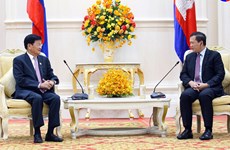Thai protesters defy government
Thailand’s anti-government protesters’ “Bangkok shutdown” has entered
the second week with many signs of possible violence in the
coming days, while the government is considering necessary security
measures to ease the tension.
Thailand’s anti-government protesters’ “Bangkok shutdown” has entered
the second week with many signs of possible violence in the
coming days, while the government is considering necessary security
measures to ease the tension.
Protesters on January 20 besieged government offices in some southern provinces as part of their campaign to force Prime Minister Yingluck Shinawatra to resign and cancel the February 2 general election.
Local media said Yingluck is seeking talks with leader of demonstrators Suthep Thaugsuban through military and business circles, while giving out signals that she is ready to resign on the condition that safety for her family is ensured. However, the ruling Peu Thai party says the demonstration will lose momentum providing the current situation can be maintained until the election.
Analysts said there is no sign that the current crisis will end soon, warning that the government may encounter more problems if they let the Bangkok shutdown prolong.
Meanwhile, the Thai Navy Seal on January 20 dismissed allegations that some of its personnel were involved in a bombing one day earlier in the heart of the Thai capital, injuring 28 people.
Naval Special Warfare Command chief Rear Adm. Vinai Klom-in said such allegations merely discredited the Navy Seal.
Three naval officers of the Naval Special Warfare Command were earlier arrested at a police checkpoint near the Government house on charge of possessing handguns without permission and using a truck with fake licence plate. They were suspected to have been hired as guards for the protesters.
At the same time, the military called on the caretaker government led by PM Yingluck and the protesters to hold dialogues to find a solution to the crisis.
Supreme Commander Thanasak Patimaprakorn said that both sides should seek a satisfactory solution without delay, describing the country as a cancer patient in desperate need of intensive treatment.-VNA
Protesters on January 20 besieged government offices in some southern provinces as part of their campaign to force Prime Minister Yingluck Shinawatra to resign and cancel the February 2 general election.
Local media said Yingluck is seeking talks with leader of demonstrators Suthep Thaugsuban through military and business circles, while giving out signals that she is ready to resign on the condition that safety for her family is ensured. However, the ruling Peu Thai party says the demonstration will lose momentum providing the current situation can be maintained until the election.
Analysts said there is no sign that the current crisis will end soon, warning that the government may encounter more problems if they let the Bangkok shutdown prolong.
Meanwhile, the Thai Navy Seal on January 20 dismissed allegations that some of its personnel were involved in a bombing one day earlier in the heart of the Thai capital, injuring 28 people.
Naval Special Warfare Command chief Rear Adm. Vinai Klom-in said such allegations merely discredited the Navy Seal.
Three naval officers of the Naval Special Warfare Command were earlier arrested at a police checkpoint near the Government house on charge of possessing handguns without permission and using a truck with fake licence plate. They were suspected to have been hired as guards for the protesters.
At the same time, the military called on the caretaker government led by PM Yingluck and the protesters to hold dialogues to find a solution to the crisis.
Supreme Commander Thanasak Patimaprakorn said that both sides should seek a satisfactory solution without delay, describing the country as a cancer patient in desperate need of intensive treatment.-VNA













